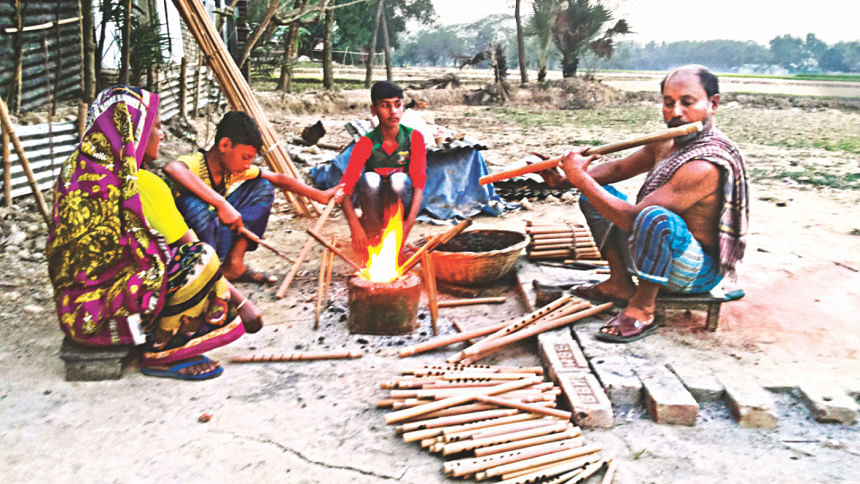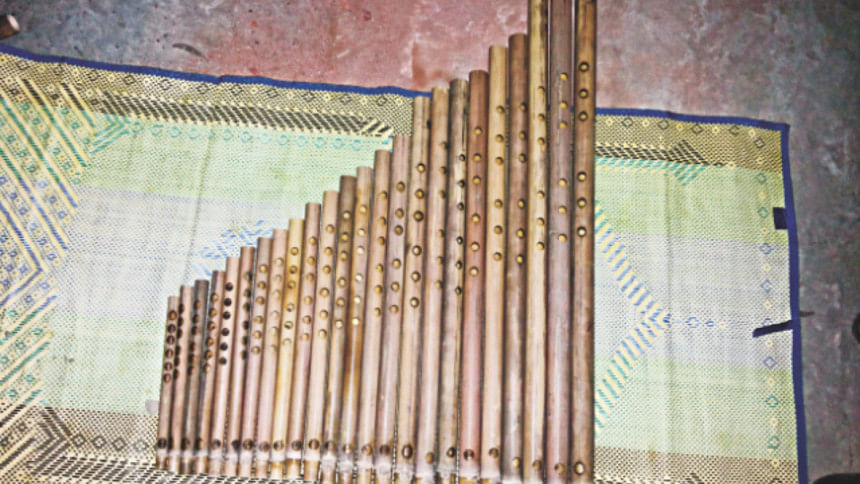Melodious success

There is a small village surrounded by coconut and mango trees in Gazipur, where drowsy herd keep on wiggling their tails during lazy afternoons by the paddy fields.
Upon entering this Gararon village under Sreepur upazila, a distant sound reaches one's ears, not just some birds chirping – a bittersweet melody, which makes one nostalgic and spirited at the same time.
Curious if you ask any passers-by humming and going about their daily chores, about the sound, or better yet, you inadvertently start following the tune yourself, the melody will guide you to Mozaffar Mondal's house.
There you will see the sixty-year-old sitting by a tree and playing “Banshi shuney r kaj nai”, by noted musician Sachin Dev Burman, who had termed Banshi (flute) as a robber in his song as the ancient musical instrument has robbed the heart of many.
Mondal too had lost his heart to the Banshi, years ago. Decades later, his love has finally paid off.
The flutes he makes, has traversed the national boundary, going as far as Tunisia, France, Australia, Singapore, Pakistan and India.
"I started playing at the age of 14. My parents would often rebuke me, but I hardly paid any heed," he said smilingly.
"My first teacher was Tuku Mia, who later left for India. Then I took lessons from Bangladesh Betar (Radio) artiste Abdur Rahman and my current Ostad is Mansur Ali Rahman," he said.
Villagers loved his music and he would often play with Baul singers in programmes; while playing he also learned how to make it. Initially he would make flutes on request. After his marriage in 1971, he started selling them.
"It was more of a hobby. My main profession was repairing watches and fountain pens.”
“With the advent of mobile phone, the earning from the repair works became less. I started making and selling flutes on a regular basis from 1992; by 2005 my entire earning came from selling flutes," he said.
FROM BAMBOO TO FLUTE
Muli bansh (a variety of clumping bamboo) which grows abundantly in the Chittagong Hill Tracts is used for making flutes, said Mondal.
Initially, he used to collect the bamboo from his locality. In 2000, during a bamboo shortage there, a client informed him about its availability in CHT. Since then, twice a year in September and March, he gets 6,000 Muli bansh from there.
"The thin bamboo costs Tk 35 per plant while the thick ones Tk 55 per stem," he said, adding that a maximum of four flutes can be made from one bamboo. "Cracked, curved, painted or insect-infected ones are left out.”
The selected stems are then dried and kept in shade for at least two months and then cut into 29 different sizes.
The sets he makes, contains 24 flutes per set, each piece representing a different scale. "A flute maker must understand how many scales can be played in a single flute, which bamboo pipe can play what particular scale," he said.
"One flute has seven holes; the blow hole is the 'balancing hole'. The rest represent the notes of Indian music, Sa, Re, Ga, Ma, Pa, Dha, Ni," Mondal explained.
"Once the pipes are varnished, the banshi is tuned for playing," he said, adding, "the price of one set of flute ranges between Tk 5,000 and Tk 7,000."
Ramesh Das, owner of Sur Torongo Store in Bogra's Cholopara, has been Mondal's client for the last 10 years. "Every year, I place orders for at least five sets," said Ramesh.
Johurul Haq of Sumon Musical House in Kurigram and Jayanta Sarker of Rangpur's Saptasur also buy flutes from Mondal.

In 2013, Mondal was contacted by a Tunisian man named Mohammad Ibn Al-laham, who lived in the capital's Uttara. "He asked if I could make flutes that look like small toy flutes with a flat side to blow air into, used by children in our country," said Mondal.
"When I said yes, he wrote a contract to buy 190,000 flutes from me," he said, adding, he had also sold his flutes to Bangladeshi and foreign artistes.
Father of two daughters and two sons, Mondal shifted his workshop as it was near a mosque and he did not want to disturb the atmosphere there. He also built another house on khas land next to the workshop.
Mondal's wife, Solimunnesa, also took up his passion, he said, adding that four others had been working at his home-based workshop for the last ten years.
"I have gone through a lot, but my passion for flutes never diminished. It's paying off finally," he smiled and started playing a Lalon song.
Mondal wants people to recognise the flute making cottage industry and help enhance flute's popularity across the border.

 For all latest news, follow The Daily Star's Google News channel.
For all latest news, follow The Daily Star's Google News channel. 



Comments